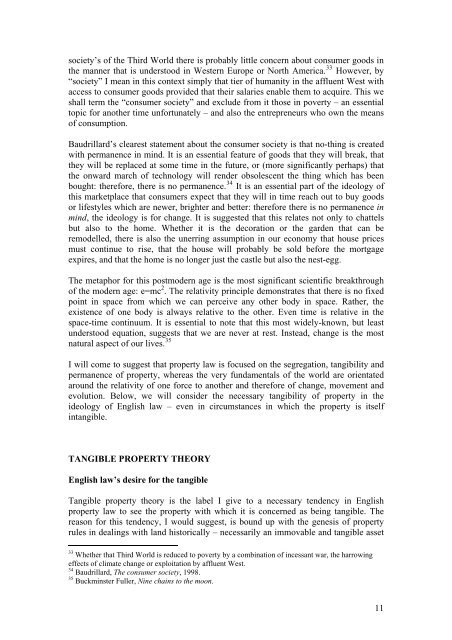The Unbearable Lightness of Property - alastairhudson.com
The Unbearable Lightness of Property - alastairhudson.com
The Unbearable Lightness of Property - alastairhudson.com
Create successful ePaper yourself
Turn your PDF publications into a flip-book with our unique Google optimized e-Paper software.
society’s <strong>of</strong> the Third World there is probably little concern about consumer goods in<br />
the manner that is understood in Western Europe or North America. 33 However, by<br />
“society” I mean in this context simply that tier <strong>of</strong> humanity in the affluent West with<br />
access to consumer goods provided that their salaries enable them to acquire. This we<br />
shall term the “consumer society” and exclude from it those in poverty – an essential<br />
topic for another time unfortunately – and also the entrepreneurs who own the means<br />
<strong>of</strong> consumption.<br />
Baudrillard’s clearest statement about the consumer society is that no-thing is created<br />
with permanence in mind. It is an essential feature <strong>of</strong> goods that they will break, that<br />
they will be replaced at some time in the future, or (more significantly perhaps) that<br />
the onward march <strong>of</strong> technology will render obsolescent the thing which has been<br />
bought: therefore, there is no permanence. 34 It is an essential part <strong>of</strong> the ideology <strong>of</strong><br />
this marketplace that consumers expect that they will in time reach out to buy goods<br />
or lifestyles which are newer, brighter and better: therefore there is no permanence in<br />
mind, the ideology is for change. It is suggested that this relates not only to chattels<br />
but also to the home. Whether it is the decoration or the garden that can be<br />
remodelled, there is also the unerring assumption in our economy that house prices<br />
must continue to rise, that the house will probably be sold before the mortgage<br />
expires, and that the home is no longer just the castle but also the nest-egg.<br />
<strong>The</strong> metaphor for this postmodern age is the most significant scientific breakthrough<br />
<strong>of</strong> the modern age: e=mc 2 . <strong>The</strong> relativity principle demonstrates that there is no fixed<br />
point in space from which we can perceive any other body in space. Rather, the<br />
existence <strong>of</strong> one body is always relative to the other. Even time is relative in the<br />
space-time continuum. It is essential to note that this most widely-known, but least<br />
understood equation, suggests that we are never at rest. Instead, change is the most<br />
natural aspect <strong>of</strong> our lives. 35<br />
I will <strong>com</strong>e to suggest that property law is focused on the segregation, tangibility and<br />
permanence <strong>of</strong> property, whereas the very fundamentals <strong>of</strong> the world are orientated<br />
around the relativity <strong>of</strong> one force to another and therefore <strong>of</strong> change, movement and<br />
evolution. Below, we will consider the necessary tangibility <strong>of</strong> property in the<br />
ideology <strong>of</strong> English law – even in circumstances in which the property is itself<br />
intangible.<br />
TANGIBLE PROPERTY THEORY<br />
English law’s desire for the tangible<br />
Tangible property theory is the label I give to a necessary tendency in English<br />
property law to see the property with which it is concerned as being tangible. <strong>The</strong><br />
reason for this tendency, I would suggest, is bound up with the genesis <strong>of</strong> property<br />
rules in dealings with land historically – necessarily an immovable and tangible asset<br />
33 Whether that Third World is reduced to poverty by a <strong>com</strong>bination <strong>of</strong> incessant war, the harrowing<br />
effects <strong>of</strong> climate change or exploitation by affluent West.<br />
34 Baudrillard, <strong>The</strong> consumer society, 1998.<br />
35 Buckminster Fuller, Nine chains to the moon.<br />
11













